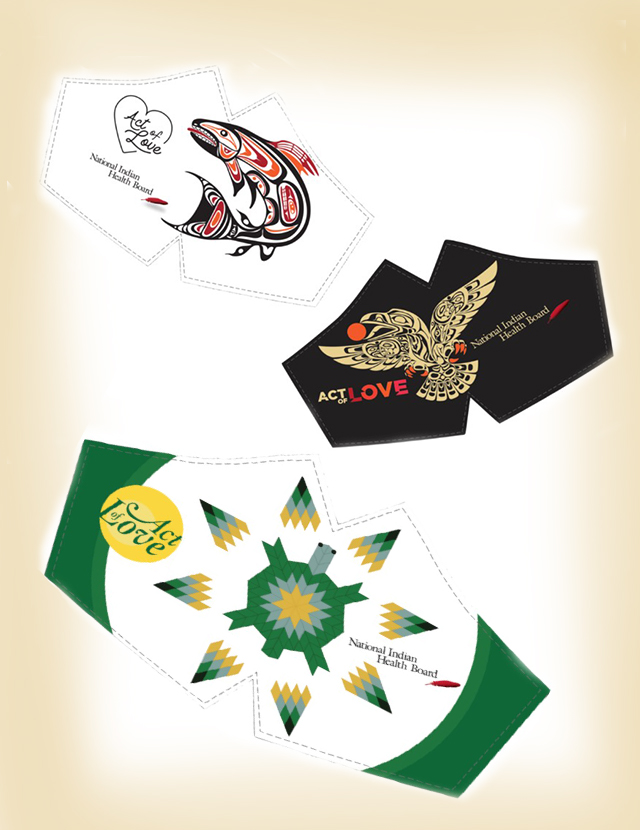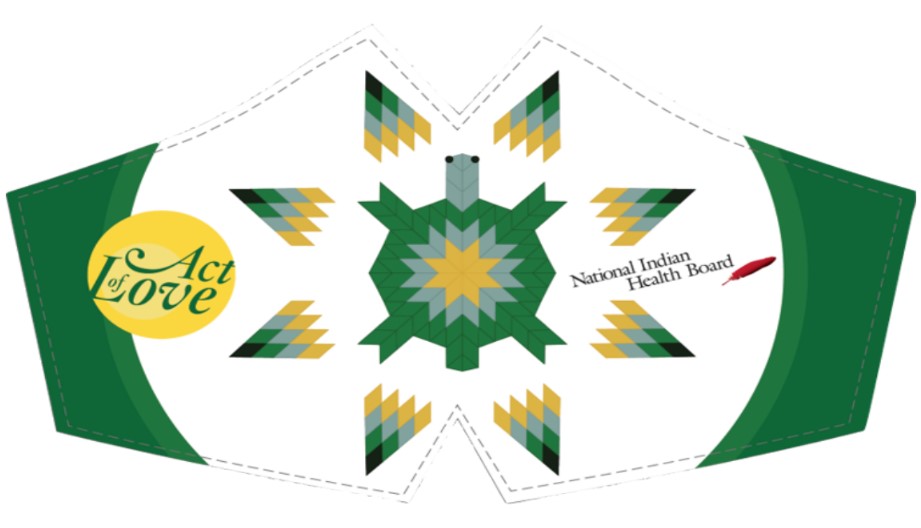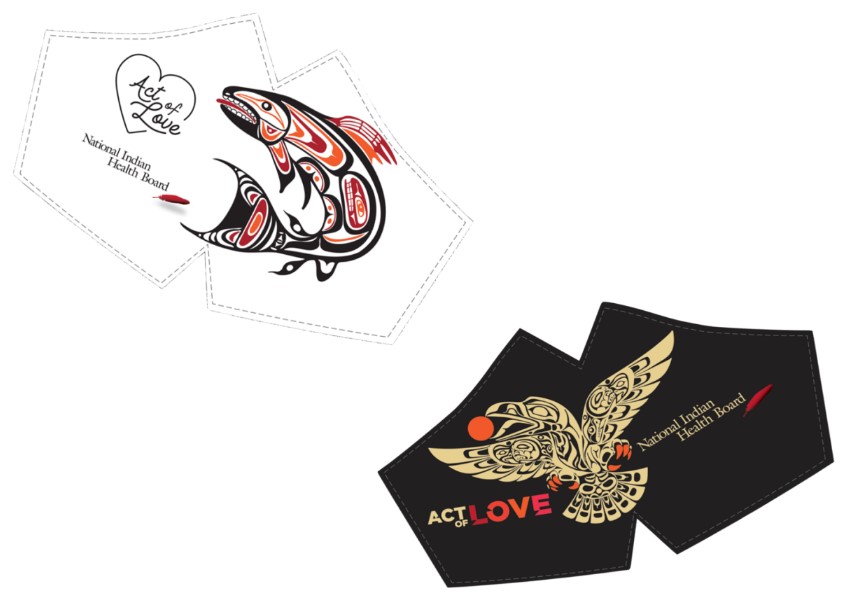‘Act of Love’ COVID-19 Campaign Utilizes Cultural Approach to Empower American Indian, Alaskan Native Communities
Program
Highlights

With support from PHI's Communities RISE, the National Indian Health Board (NIHB) launched the “Act of Love” campaign which focused on COVID-19 messaging and cultural artwork to help build trust in American Indian and Alaskan Native communities and lift up the importance of compassion, solidarity, and love for community.
7 new regional-specific “Act of Love” designs created or in development
-
Focus Areas
Communicable Disease Prevention, Healthy Communities -
Expertise
Coalition & Network Building, Outreach & Dissemination -
Strategic Initiatives
COVID-19
In the summer of 2020, the National Indian Health Board (NIHB) launched the “Act of Love” campaign. At the time, disparities among American Indians/Alaska Natives (AI/ANs) were staggering. A CDC report revealed COVID-19 incidence rates were 3.5 times higher for AI/ANs compared to White Americans during the first seven months of the pandemic. According to APM Research Lab, one in 475 AI/ANs died from COVID-19, compared to one in 825 for White Americans and one in 645 for Black Americans.
To depoliticize simple public health preventive measures everyone could take, the “Act of Love” campaign carried a simple, straightforward message. Wearing your mask indoors and adhering to tribal public health policies showed compassion, solidarity, and love for the community.
“The messaging of the campaign focused on what you could do for your community to keep people safe,” explains Tyler Dougherty, then NIHB Director of Public Health Policy and Programs, “Specifically for the most vulnerable – our tribal elders, our culture keepers, our native language speakers, our children, our immunocompromised.”
In historically oppressed communities, there was a lot of resistance to public health messaging just by virtue of the fact that it was coming from official government sources.
“Characterizing the historical relationship between the US Federal government and American Indian and Alaskan Native tribes as problematic is an understatement. There is a mountain of evidence to distrust the relationship with the US Federal government. Up until the early seventies, AI/AN women were still being sterilized without consent and without their knowledge at Indian Health Service facilities in certain areas of the country. That is how recent some of these atrocities on tribal communities are, and there is still living memory of that in some of these communities and overcoming the trust barriers is an ongoing endeavor,” Dougherty, who was raised with Cheyenne – Arapaho traditions by his adopted grandfather, explains.
To overcome these barriers, NIHB partnered with the Public Health Institute’s Communities RISE to develop materials and messaging, not just with the community but from within the community. “It was truly by American Indian and Alaskan Natives for American Indian and Alaskan Natives throughout,” elaborates Dougherty.

Sovereignty & Solidarity
The NIHB represents Tribal governments—those that operate their health care delivery systems through contracting and compacting and those receiving health care directly from the Indian Health Service (IHS).
“We provide public health, education, training opportunities, sub-awards into communities, tribal public health capacity and infrastructure, building services, technical assistance, policy, budget analysis, advocacy, and regulatory tracking. We provide quite a few services to public health and health services,” Dougherty notes.
Governed by thirteen board members—one member for each of the twelve regions plus one member at large— NIHB was created and managed by the tribe. The Board is composed of elected tribal leaders from each area. It is trusted and has a hard-earned reputation for thoroughly vetting and sharing trustworthy information.
“It began with a single design and had gone through a couple of reformations, but nothing resonated across the country like we had wanted this campaign to do,” explains Dougherty of the earliest phases of the campaign before the partnership with RISE.
RISE helped the campaign to develop regional-specific designs to lift up the local community and culture. Distinctive artwork from each IHS area elevates the cultures of those regions. Six new designs were created with support from RISE (with a seventh being developed more recently in collaboration with Southwest Tribes following that initial grant period with additional funding because the region did not feel adequately represented). Each regional representative on the NIHB Board provided inspiration for designs. They offered regional art, sketches, and motifs. They reviewed everything, considered mock-ups, and provided feedback. The aesthetic was wholly drawn from the community.
The messaging of the campaign focused on what you could do for your community to keep people safe. “We were able to refine some of our positive vaccine messaging through RISE, as well,” says Dougherty, who oversaw the evolution of the campaign from CDC guidelines and safety protocols to messaging for the vaccines. Postcards were developed and designed to encourage folks to perform Acts of Love, like wearing a mask, washing their hands, watching their distance, and getting vaccinated and/or boosted. Three to five postcards were placed in “Act of Love” boxes mailed to households throughout the community, so recipients could send vaccine-hesitant friends or family members gentle, personalized reminders to take action.
“We feel like it has had a really great impact on keeping vaccination rates high and boosting them in many tribal areas! We saw rapid decreases in the spread of COVID-19,” enthuses Dougherty.
We were able to refine some of our positive vaccine messaging through RISE... We feel like it has had a really great impact on keeping vaccination rates high and boosting them in many tribal areas. We saw rapid decreases in the spread of COVID-19.Tyler Dougherty
Former NIHB Director of Public Health Policy and Programs
Empowering Communities Through Data
“RISE was truly a collaboration of partnerships across populations that have experienced inequities and historically faced massive barriers to obtaining public health services and health services, and it was a coming together of the minds of passionate community workers and community servants to collectively come together and work to overcome many of those inequities,” Dougherty says of the RISE project.
A biostatistician by trade and training with a Master’s in Public Health, Dougherty is most impressed by how RISE advocated that the tribe should own data collected on tribal citizens on tribal land. “Data is power!” he explains, “RISE empowered communities that historically had been marginalized and experienced barriers in accessing their own data. They were amazing in making sure communities got access to their data in communities that they were reporting to help inform their decision-making to help empower communities to use their own data for the benefit of their communities.”

Conclusion
Dougherty sees Tribal Health as planning seven generations and looking at what can be done to set tribal communities up for success in health and public health. It requires a strategy that is guided by data, advocates for policies, addresses social determinants and continues to overcome distrust when it benefits the community’s collective health.
As for “Act of Love,” Dougherty feels the campaign has staying power. “It can be sustained beyond infectious disease mitigation and control, so you know, getting your mammogram once a year is an act of love to you, your children, your family,” he observes. A long-term, intergenerational health strategy requires a solid prevention strategy—and the “Act of Love” campaign offers a cornerstone that can support this work for decades to come.
Communities RISE Together supports COVID vaccination efforts in African-American, Asian-American/Pacific-Islander, Latinx, Native-American, rural, immigrant/migrant and low-income, older adult populations. Communities RISE Together works on the ground in more than 220 counties in 27 states in communities with low vaccination rates by calling on the capacity of 2,400 community-based organizations who have reached over 100 million people across the nation. The initiative is a collaboration between WE in the World, the Well Being in the Nation (WIN) Network and Public Health Institute.
A version of this impact story first appeared in a Communities RISE newsletter.
Work With Us
You change the world. We do the rest. Explore fiscal sponsorship at PHI.
Support Us
Together, we can accelerate our response to public health’s most critical issues.
Find Employment
Begin your career at the Public Health Institute.
